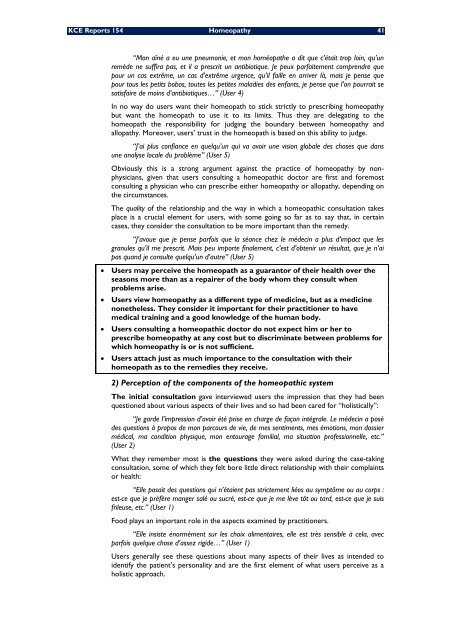Etat des lieux de l'homéopathie en Belgique - KCE
Etat des lieux de l'homéopathie en Belgique - KCE
Etat des lieux de l'homéopathie en Belgique - KCE
You also want an ePaper? Increase the reach of your titles
YUMPU automatically turns print PDFs into web optimized ePapers that Google loves.
<strong>KCE</strong> Reports 154 Homeopathy 41<br />
“Mon aîné a eu une pneumonie, et mon homéopathe a dit que c’était trop loin, qu’un<br />
remè<strong>de</strong> ne suffira pas, et il a prescrit un antibiotique. Je peux parfaitem<strong>en</strong>t compr<strong>en</strong>dre que<br />
pour un cas extrême, un cas d’extrême urg<strong>en</strong>ce, qu’il faille <strong>en</strong> arriver là, mais je p<strong>en</strong>se que<br />
pour tous les petits bobos, toutes les petites maladies <strong><strong>de</strong>s</strong> <strong>en</strong>fants, je p<strong>en</strong>se que l’on pourrait se<br />
satisfaire <strong>de</strong> moins d’antibiotiques…” (User 4)<br />
In no way do users want their homeopath to stick strictly to prescribing homeopathy<br />
but want the homeopath to use it to its limits. Thus they are <strong>de</strong>legating to the<br />
homeopath the responsibility for judging the boundary betwe<strong>en</strong> homeopathy and<br />
allopathy. Moreover, users’ trust in the homeopath is based on this ability to judge.<br />
“J’ai plus confiance <strong>en</strong> quelqu’un qui va avoir une vision globale <strong><strong>de</strong>s</strong> choses que dans<br />
une analyse locale du problème” (User 5)<br />
Obviously this is a strong argum<strong>en</strong>t against the practice of homeopathy by nonphysicians,<br />
giv<strong>en</strong> that users consulting a homeopathic doctor are first and foremost<br />
consulting a physician who can prescribe either homeopathy or allopathy, <strong>de</strong>p<strong>en</strong>ding on<br />
the circumstances.<br />
The quality of the relationship and the way in which a homeopathic consultation takes<br />
place is a crucial elem<strong>en</strong>t for users, with some going so far as to say that, in certain<br />
cases, they consi<strong>de</strong>r the consultation to be more important than the remedy.<br />
“J’avoue que je p<strong>en</strong>se parfois que la séance chez le mé<strong>de</strong>cin a plus d’impact que les<br />
granules qu’il me prescrit. Mais peu importe finalem<strong>en</strong>t, c’est d’obt<strong>en</strong>ir un résultat, que je n’ai<br />
pas quand je consulte quelqu’un d’autre” (User 5)<br />
• Users may perceive the homeopath as a guarantor of their health over the<br />
seasons more than as a repairer of the body whom they consult wh<strong>en</strong><br />
problems arise.<br />
• Users view homeopathy as a differ<strong>en</strong>t type of medicine, but as a medicine<br />
nonetheless. They consi<strong>de</strong>r it important for their practitioner to have<br />
medical training and a good knowledge of the human body.<br />
• Users consulting a homeopathic doctor do not expect him or her to<br />
prescribe homeopathy at any cost but to discriminate betwe<strong>en</strong> problems for<br />
which homeopathy is or is not suffici<strong>en</strong>t.<br />
• Users attach just as much importance to the consultation with their<br />
homeopath as to the remedies they receive.<br />
2) Perception of the compon<strong>en</strong>ts of the homeopathic system<br />
The initial consultation gave interviewed users the impression that they had be<strong>en</strong><br />
questioned about various aspects of their lives and so had be<strong>en</strong> cared for “holistically”:<br />
“Je gar<strong>de</strong> l’impression d’avoir été prise <strong>en</strong> charge <strong>de</strong> façon intégrale. Le mé<strong>de</strong>cin a posé<br />
<strong><strong>de</strong>s</strong> questions à propos <strong>de</strong> mon parcours <strong>de</strong> vie, <strong>de</strong> mes s<strong>en</strong>tim<strong>en</strong>ts, mes émotions, mon dossier<br />
médical, ma condition physique, mon <strong>en</strong>tourage familial, ma situation professionnelle, etc.”<br />
(User 2)<br />
What they remember most is the questions they were asked during the case-taking<br />
consultation, some of which they felt bore little direct relationship with their complaints<br />
or health:<br />
“Elle posait <strong><strong>de</strong>s</strong> questions qui n’étai<strong>en</strong>t pas strictem<strong>en</strong>t liées au symptôme ou au corps :<br />
est-ce que je préfère manger salé ou sucré, est-ce que je me lève tôt ou tard, est-ce que je suis<br />
frileuse, etc.” (User 1)<br />
Food plays an important role in the aspects examined by practitioners.<br />
“Elle insiste énormém<strong>en</strong>t sur les choix alim<strong>en</strong>taires, elle est très s<strong>en</strong>sible à cela, avec<br />
parfois quelque chose d’assez rigi<strong>de</strong>…” (User 1)<br />
Users g<strong>en</strong>erally see these questions about many aspects of their lives as int<strong>en</strong><strong>de</strong>d to<br />
i<strong>de</strong>ntify the pati<strong>en</strong>t’s personality and are the first elem<strong>en</strong>t of what users perceive as a<br />
holistic approach.

















